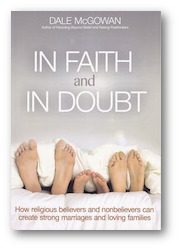Shortly after my wife and I started dating, I knew I wanted to marry her. Compared to everything else she brought to the relationship, the fact that she was a believer and I was an atheist was a footnote to me. Honestly, if I’d learned she had a second head growing out of the back of her neck, I’d have bought it a little hat.
I knew we differed on theological abstractions, but I also knew we shared the most important values and priorities. Still, after six months, my atheism hadn’t come up. I’d been sitting next to her in church every Sunday, so there was no reason for her to assume I wasn’t a believer. But I knew I couldn’t enter an engagement, much less a marriage, on false pretenses.
I was frankly terrified I might lose her over it, but I knew it was just too big to come up years later as a “funny-thing-about-me” revelation. If it was going to be a big deal, it needed to be a big deal right then, before we got engaged.
We both lived in LA at the time and occasionally drove to San Francisco to see her parents. On one such trip, in the middle of the Central Valley, I mustered the nerve. I don’t remember the exact words I said, but at some point it was out there: I don’t believe in God, it’s something I’ve thought about seriously for years, and it’s not likely to ever change. Is that, uh…okay with you?
The tires thrummed for a while. She clearly hadn’t seen it coming and seemed a little shaken.
Finally she said, “Well…is it okay with you that I do believe?”
“Of course,” I said. I’d known that from the beginning.
Another long pause.
“It has to be okay for me to go to church.” Notice that this was not in the form of a question. Of course that’s okay, I said.
And then I learned something I might never have known otherwise: I learned why it was so important for her to go to church. And as is often the case, it had almost nothing to do with theology.
She laid out the whole story. Her stepdad, a former Baptist minister, had an ugly falling out with his church when he left his first wife for his second. As a result, he cut all ties with the church—not just that church, but all churches, all religion—and he didn’t allow her very religious mom or Becca and her sister to attend. Becca vowed to herself at the time that she was bloody well going to church once she got out of that house, and that no one was ever going to keep her from it again.
It wasn’t religious uniformity she needed from her eventual husband. She just needed to know that that particular bit of family history wasn’t going to repeat itself. It was never about salvation for her. As much as anything, her churchgoing was an act of proxy redemption for her mom.
That was an important discovery for me. I’d have been troubled to learn that Becca’s religious beliefs and practices were centered on the fear of hell or even a need to please God. These are beliefs that I find not just false but dehumanizing. I don’t mind if my neighbor holds those opinions, as long as they’re not forced on me. But if the beliefs of my intended lifelong companion fell into that fearful or obeisant category, I knew it would raise compatibility questions from my side of the equation.
Instead, I learned that she attended church for other reasons. In addition to family history, she went for the sense of community and human connection she felt, for the opportunity to slow down and reflect, to engage the world in a different way from the rest of the week. It was rewarding and fulfilling to her for reasons I could completely respect, even if I didn’t feel those needs as much myself. And her reasons were similar to the reasons most churchgoers go to church—to feel connected, to focus on meaning and purpose, to reinforce her own identity. God was the frame in which her human values were expressed, including values I shared with her.
I also learned that although she was Baptist by birth, upbringing, and baptism, she didn’t hold to several specific tenets of the Southern Baptist Conference that would have presented problems for me. One doctrine would have been a particular issue if she believed it: that those who do not accept Jesus Christ as their Lord and Savior are bound for hell. Even though I don’t believe in hell, I was glad to hear she didn’t think I belonged there. A relationship in which one partner thinks the other is worthy of eternal punishment isn’t a healthy one.
Instead, by showing a tendency toward universalism—that all people are saved, regardless of beliefs—Becca was again very much in the U.S. Christian mainstream. Sixty-five percent of U.S. Christians believe that non-Christians can end up in heaven, and most of those include the nonreligious among the saved.
By the end of the conversation, I was relieved, we knew each other a lot better, she had articulated her own values and beliefs in a way that was new even to her, and the biggest secret I had was out in the open.
And it had gone just fine.
Not that it always does. I’ll never forget the thirty-ish man who came up to me after a talk in North Carolina years ago, looking like he hadn’t slept in days. He and his wife of ten years had both been Mormon, but his religious faith had been slipping for some time. When he told her a week earlier that he no longer believed in God, she said he was “sick and evil,” then took the kids and left him the same night. He hadn’t heard from her since and didn’t know where his children were. Neither side of the family would answer his calls. An intense shunning wall had come down around him.
The nonreligious partner doesn’t always react well, either. I’ve heard from many who wondered if they could continue to respect their partners when they learned they were religious. “I have to admit that I suddenly saw him differently,” said one. “Instead of the confident guy I thought he was, I couldn’t help seeing a gullible, fearful child.”
In both cases, the partner hearing the news immediately conjured an extreme version of the other position and (naturally) recoiled in horror from it. It’s a perfectly human reaction. When we don’t have all the information, we fill in the gaps with the worst things possible. Remember what was written in unexplored regions around the edges of early maps? They didn’t just write, “Unknown.” They wrote: Here be dragons.
We often do the same thing with people. A religious person often hears someone is an atheist and pictures Stalin. An atheist hears someone is religious and pictures Pat Robertson. Here be dragons.
Sometimes the shoe fits. But much more often, two people who think they are peering across an abyss will actually share most of their values, even if they’ve placed those values in different frames.
So the revelation that a partner or prospective partner has a different worldview is not the end of the conversation, it’s the beginning. If we use it as a litmus test, a lot of wonderful relationships would end before they began. Including mine.
Image via Shutterstock
Adapted from In Faith and in Doubt: How Religious Believers and Nonbelievers Can Create Strong Marriages and Loving Families by Dale McGowan (2014)
DALE McGOWAN is the author of several books from the nonreligious perspective. He was Harvard Humanist of the Year in 2008 and founded the humanist charity Foundation Beyond Belief in 2010.
He is currently Content Development Editor and Atheist Channel Managing Editor at Patheos. He lives with his wife and children in Atlanta.
















